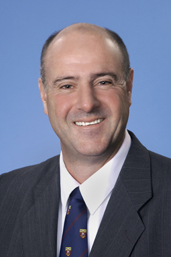HOUSTON – The National Space Biomedical Research Institute (NSBRI) has named Dr. Graham Scott as its new vice president and institute associate director.
Scott brings more than 30 years of scientific, military aviation and commercial experience to NSBRI, a NASA-funded consortium of institutions studying the health risks related to long-duration spaceflight and developing countermeasures to mitigate the risks. Scott’s background includes impressive positions leading large scientific teams conducting groundbreaking research in the areas of gene sequencing and proteomics and in technology development.
His duties at NSBRI include managing the institute’s science and technology program as chief scientist and overseeing operation of its education programs.
“Dr. Scott’s expertise in biotechnology and leadership will provide a new exciting dimension to NSBRI’s efforts to protect astronaut health and to improve life on Earth,” said Dr. Jeffrey P. Sutton, NSBRI president and CEO. “Dr. Scott’s energy and vision will also strengthen our education programs and enhance the utilization of the Institute’s new state-of-the-art Consolidated Research Facility.”
Prior to joining NSBRI, Scott served as market development director for sequencing at Life Technologies. In addition to his position at NSBRI, Scott holds a faculty position at Baylor College of Medicine (BCM), NSBRI’s lead institution.
“I am honored to be joining the talented and dedicated NSBRI team,” Scott said. “Over the last decade, I participated in the genomics and proteomics revolution that is now transforming the practice of medicine. These ‘omics’ technologies are ushering in a new era of personalized treatment and countermeasures, further reducing risks associated with human space travel.”
Scott’s scientific endeavors had a strong start as a Welch Postdoctoral Fellow under the mentorship of Rice University’s Dr. Robert F. Curl, who is the 1996 Nobel Laureate in Chemistry. Then, Scott became a member of the Human Genome Project team at the BCM Human Genome Sequencing Center, where he gained valuable research experience – working with gene sequencing technologies and leading large interdisciplinary teams.
After the completion of the Human Genome Project, Scott served in management roles at Sigma-Aldrich Corporation, EMD Biosciences and Agilent Technologies before moving to Life Technologies Scott has more than 30 peer-reviewed scientific publications and four issued U.S. patents.
Scott is a native of New Zealand, where he served as a pilot for nine years in the Royal New Zealand Air Force. He received bachelor’s degrees in chemistry and physics and a Ph.D. in chemistry from the University of Canterbury, Christchurch, New Zealand.
NSBRI science, technology and education projects take place at more than 60 institutions across the United States. The science and technology development projects address space health concerns, which include bone and muscle loss, cardiovascular alterations, radiation exposure, neurobehavioral and psychosocial factors, remote medical care, and habitability and performance issues. Research findings also impact the understanding and treatment of similar medical conditions experienced on Earth.
–30–
Brad Thomas
NSBRI
713-798-7595
rbthomas@bcm.edu






